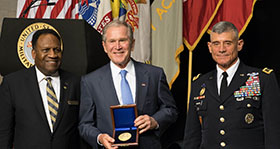2017 Thayer Award Presented to Former President George W. Bush
 According to CDT Kelley Ericson ’21, the Corps of Cadets had been buzzing with excitement all week over the arrival of former President George W. Bush, the 2017 recipient of the Thayer Award, and when he entered Washington Hall for the award dinner and ceremony he received what CDT Jackson Luff ’18 called, “Some of the loudest cheers I ever heard in the Mess Hall.” [SEE PHOTOS]
According to CDT Kelley Ericson ’21, the Corps of Cadets had been buzzing with excitement all week over the arrival of former President George W. Bush, the 2017 recipient of the Thayer Award, and when he entered Washington Hall for the award dinner and ceremony he received what CDT Jackson Luff ’18 called, “Some of the loudest cheers I ever heard in the Mess Hall.” [SEE PHOTOS]
Presented annually by the West Point Association of Graduates since 1958, the Thayer Award recognizes a U.S. citizen whose outstanding character, accomplishments, and stature in the civilian community draw wholesome comparison to the qualities for which West Point strives, in keeping with its motto: Duty, Honor, Country. In his remarks introducing the 2017 recipient, LTG (R) Larry Jordan ’68, Chairman of the West Point Association of Graduates, noted the concept of the Thayer Award originated with the Class of 1931, which sought to create an award that would contribute to the public’s understanding of West Point and the principles on which it is built.
In its 60-year history, the Thayer Award has been given to scientists and astronauts, jurists and scholars, members of the clergy and members of Congress, and three former presidents of the United States, including Bush’s father, President George H.W. Bush, the 1994 recipient. “The one thing shared by all Thayer Award recipients is an intense love of country and an untiring effort to make our nation better and stronger,” said Jordan, “President George W. Bush’s name on the Thayer Award plaque greatly enhances the prestige of this institution.”
While there are numerous reasons for presenting Bush the Thayer Award, from his pre-presidency roles as a member of the Texas Air National Guard and two-term governor of Texas to his post-presidency role with the George W. Bush public policy institution, West Point Superintendent LTG Robert L. Caslen ’75 emphasized Bush’s leadership and selfless service following the events of September 11, 2001, during his remarks opening the award ceremony. “In the aftermath of those horrific attacks, our president, George W. Bush, would rally us as a nation and lead us as we confronted a new kind of evil threat, one that attacked us not for our land or wealth, but because of our ideals and because of our freedom,” Caslen said.
In his speech accepting the Thayer Award, Bush also returned to September 11th, particularly to the graduation speech he gave to the West Point Bicentennial Class of 2002 nine months after that fateful day. Quoting that speech, Bush said, “Every West Point class is commissioned in the armed forces, but some West Point classes are also commissioned by history.” In the years following that speech, Bush noted that thousands of graduates have taken up the cause to advance freedom. “They did their duty with honor for their country,” he said. But while the lessons of September 11 are still an important part of the West Point curriculum, Bush said that today’s cadets will face new challenges. He outlined these challenges earlier in the day at the “Spirit of Liberty” forum held at Lincoln Center in New York City, but as he repeated them during his Thayer Award remarks he related specific points to cadets. For example, when he mentioned “living up to civic values,” Bush said, “I am counting on the cadets of West Point to serve as examples of character and integrity for your generation, and I’m confident that you will rise to the occasion.” Later, when discussing the need for American institutions “to step up and provide cultural and moral leadership for this nation,” Bush noted that the country “only need look to where the Hudson River bends to see how to do this.” Summing up his points, Bush said, “We are a nation waiting for a reminder of its better self, and I believe that reminder can be found right here at West Point.”
Bush’s speech was not all serious public policy recommendations. Early on he told cadets that he brushed up on his knowledge of Sylvanus Thayer, Class of 1808 and the Academy’s fifth Superintendent (1817-33) before coming to West Point. “Thayer founded the West Point Dialectical Society to foster debate and good dialect,” Bush noted, “which makes my selection for this honor somewhat puzzling.” But every light-hearted moment was followed by another filled with sincerity. In his speech’s conclusion, for example, he mentioned how people often come up to him and ask if he misses being the president. “I miss the pastry chef,” he joked, but then he offered the following: “There is one thing I miss—a lot—being the commander in chief of a collection of selfless men and women who volunteered to defend the United States in a time of danger … our future leaders who will promote our democratic values and our way of life through their actions and example—men and women who live by the words: Duty, Honor, Country.” The loudest cheers in the Mess Hall, indeed.